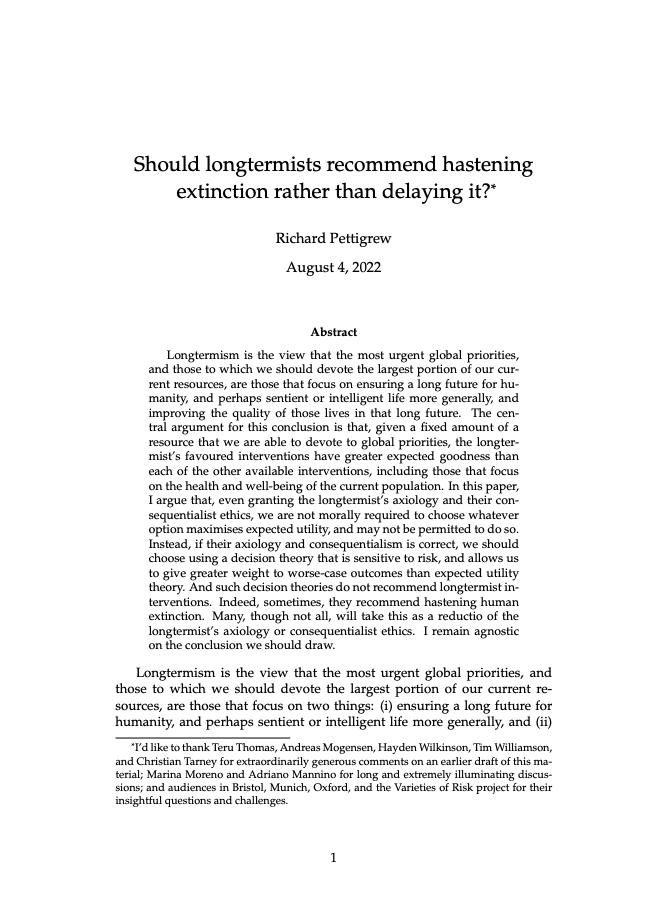Should longtermists recommend hastening extinction rather than delaying it?
Richard Pettigrew (University of Bristol)
GPI Working Paper No. 2-2022, forthcoming at The Monist
Longtermism is the view that the most urgent global priorities, and those to which we should devote the largest portion of our current resources, are those that focus on ensuring a long future for humanity, and perhaps sentient or intelligent life more generally, and improving the quality of those lives in that long future. The central argument for this conclusion is that, given a fixed amount of a resource that we are able to devote to global priorities, the longtermist’s favoured interventions have greater expected goodness than each of the other available interventions, including those that focus on the health and well-being of the current population. In this paper, I argue that, even granting the longtermist’s axiology and their consequentialist ethics, we are not morally required to choose whatever option maximises expected utility, and may not be permitted to do so. Instead, if their axiology and consequentialism is correct, we should choose using a decision theory that is sensitive to risk, and allows us to give greater weight to worse-case outcomes than expected utility theory. And such decision theories do not recommend longtermist interventions. Indeed, sometimes, they recommend hastening human extinction. Many, though not all, will take this as a reductio of the longtermist’s axiology or consequentialist ethics. I remain agnostic on the conclusion we should draw.
Other working papers
Aggregating Small Risks of Serious Harms – Tomi Francis (Global Priorities Institute, University of Oxford)
According to Partial Aggregation, a serious harm can be outweighed by a large number of somewhat less serious harms, but can outweigh any number of trivial harms. In this paper, I address the question of how we should extend Partial Aggregation to cases of risk, and especially to cases involving small risks of serious harms. I argue that, contrary to the most popular versions of the ex ante and ex post views, we should sometimes prevent a small risk that a large number of people will suffer serious harms rather than prevent…
AI takeover and human disempowerment – Adam Bales (Global Priorities Institute, University of Oxford)
Some take seriously the possibility of AI takeover, where AI systems seize power in a way that leads to human disempowerment. Assessing the likelihood of takeover requires answering empirical questions about the future of AI technologies and the context in which AI will operate. In many cases, philosophers are poorly placed to answer these questions. However, some prior questions are more amenable to philosophical techniques. What does it mean to speak of AI empowerment and human disempowerment? …
‘The only ethical argument for positive 𝛿’? – Andreas Mogensen (Global Priorities Institute, Oxford University)
I consider whether a positive rate of pure intergenerational time preference is justifiable in terms of agent-relative moral reasons relating to partiality between generations, an idea I call discounting for kinship. I respond to Parfit’s objections to discounting for kinship, but then highlight a number of apparent limitations of this…

